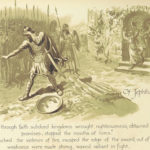We run our website the way we wished the whole internet worked: we provide high quality original content with no ads. We are funded solely by your direct support. Please consider supporting this project.

The Politics of Jesus
Many are so conditioned by the mindset of the world that they can’t even envision an alternative way of affecting society and politics other than by playing the political game as it is done by the established governmental system. Some thus conclude that, since Jesus didn’t try to overhaul the political systems of his day by using the common tactics of those systems, the Christian faith must be primarily about personal piety and thus has no social relevance.
In his book The Politics of Jesus, John Howard Yoder has demonstrated that everything about Jesus’ ministry was socially and politically relevant. Precisely because he did not allow the politics of his day to define his ministry, he positioned himself to make a revolutionary prophetic comment, and ultimately have revolutionary impact on the society and politics of his day.
Jesus didn’t buy into the limited options the culture placed before him. He rather exposed ugly injustices in all kingdom-of-the-world options by offering a radically distinct alternative. It is a kingdom that resists the demonic pull toward coercive, “power-over” violence that characterizes all versions of the kingdom of the world. (See post on the connection between violence and governments.) It is a kingdom that, through self-sacrifice, unmasks the ugly injustice and violence of all versions of the kingdom of the world and the demonic powers that fuel them. It is a kingdom that doesn’t wage war “against flesh and blood” but instead fights against “rulers, against the authorities, against the cosmic powers of this present darkness” (Eph 6:12) that hold all people in bondage.
It is a beautiful kingdom that is not so much spoken as it is displayed in loving action. For example, Jesus never entered into the fray of particular debates about the status of women in society. He rather exposed the ugliness of patriarchalism by the countercultural way he treated women. Ignoring negative consequences for this reputation—and ultimately for his life—Jesus befriended them and gave them a culturally unprecedented dignity. In a society in which women were generally understood to be the property of men and in which women had few rights, Jesus’ actions were revolutionary.
The same may be said of Jesus’ treatment of social outcasts, including lepers, the blind, the demonized, the poor, prostitutes, and tax collectors. Instead of trying to legislate justice for them, he provided an alternative to the sociopolitical structures of the world and exposed the injustices of these structures in the process.
Most fundamentally, Jesus exposed the barbarism of the Roman government, and ultimately the barbarism of all kingdoms of the world, by allowing himself to be crucified by them. Instead of using the power available to him to preserve his life, he exercised the power of love by giving his life for the very people who were taking it. Jesus’ death established that the kingdom community would not be characterized by “power over” but by “power under.” It would be a community where people have the same attitude of Jesus and place other people’s interests above their own (Phil 2:4-5).
In this way, Jesus offered a different kind of politics. He provided a beautiful alternative to the “power over” structure of the world and exposed the self-centered ugliness of these structures in the process.
This is the politics that the community of God is called to emulate, characterized by Calvary-like love. As such, this community strives for justice not by conquering but by being willing to suffer. How socially and politically revolutionary it would be if we put our trust in Jesus’ politics instead of the politics of this world!
Photo credit: Funky64 (www.lucarossato.com) via VisualHunt.com / CC BY-NC-ND
Category: General
Tags: Jesus, Love, Non-Violence, Politics, Power, Sacrifice
Topics: Ethical, Cultural and Political Issues
Related Reading

Why do you argue that discipleship and politics are rooted in opposite attitudes?
Question. At a recent conference I heard you argue against the idea that there could ever be a distinctly “Christian” political position by contending that political disputes are premised on a claim to superiority while discipleship is fundamentally rooted in humility. I don’t think I get what you mean. Can you explain this? Answer: In…

Lighten Up: Jesus Makes Things Hard
Maybe Mark Driscoll is on to something. I guess Jesus really does want to make someone bleed. ;)

Does Hebrews 11 Praise Violence? A Response to Paul Copan (#2)
Once or twice a week, as time allows, I will be responding to criticisms of Crucifixion of the Warrior God (CWG) that were raised by Paul Copan in a recent paper that he delivered at the Evangelical Theological Society. In my first post in this series I responded to Copan’s claim that Paul’s quotation from…

3 Traits of a Jesus Kind of Church
A Jesus kind of church (See an introductory post on this here) is called to represent God, just as Christ did. The church is Christ continuing to manifest the true God. Bonhoeffer put it this way, “The Church is not a religious community of worshippers of Christ but is Christ Himself who has taken form…

Q&A: When Confronting Unambiguous Evil
Q: I read your post on Abortion. I found it compelling and am considering moving toward that kind of a position on the matter. I am also reading “Uncle Tom’s Cabin” for the first time and wonder if Boyd’s response to slavery (were it currently an issue as abortion is today) would be a similar approach…

Spiritual Warfare: What is it?
The Kingdom is “not of this world,” and neither is its warfare. Jews had always believed that God confronted spiritual opposition in carrying out his will on earth. In the Old Testament, these evil forces were usually depicted as cosmic monsters and hostile waters that threatened the earth. For a variety of reasons this belief…
